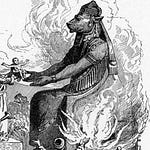I’m delighted to share this important conversation with James Roguski about the WHO’s “Pandemic Preparedness Treaty”. We’ve heard a lot about it, but what exactly is the treaty and what are the implications for us as individuals and nation states?
NB - I’ve been using a new platform to record these conversations which automatically produces show notes which I’ve included below (after some judicious editing and additions). I’m not sure yet if I like them or not. They feel a bit wooden and generic (feedback appreciated) but I’ll keep sharing them with you for now as I think it adds an extra dimension to the discussion… and it means I can get more done..!
Summary
Ben Rubin and James Roguski discuss the World Health Organization's Pandemic Preparedness Treaty, and its implications for individuals and nation states.
We highlight the centralisation of power and funding in the WHO, which is largely influenced by donations from member nations and corporations.
I was surprised to discover that negotiations for the treaty are largely driven by a trade dispute, with poorer nations seeking access to pharmaceutical resources and manufacturing capabilities. My original take was it was primarily about asserting power, not making money. Although those things often go hand in hand.
We emphasise the profit-driven nature of the healthcare industry and call for awareness and action to challenge the current system. The conversation explores the need for individuals to take charge of their own health and challenges the idea of managing health systems from a single global location.
We emphasise the importance of delivering fair and value-based healthcare that prioritises patient well-being over corporate profits. The discussion highlights the significance of accessing accurate and reliable information to understand the documents and agreements related to healthcare.
The conversation also explores the creation of a global DNA database and the parallels between the WHO negotiations and climate change conferences.
We encourage individuals to critically analyse publicly available information and make informed decisions based on their own assessment.
Takeaways
The World Health Organization is heavily influenced by donations from member nations and corporations, raising concerns about its independence and priorities.
The pandemic preparedness treaty negotiations are driven by a trade dispute, with poorer nations seeking access to pharmaceutical resources and manufacturing capabilities.
The negotiations involve proposals for a global DNA database and the creation of a central authority with control over pandemic response measures.
The healthcare industry operates on a profit-driven model, often prioritizing financial interests over public health.
Awareness and action are needed to challenge the current system and promote a healthcare approach that prioritizes the well-being of individuals and communities. Individuals should take responsibility for managing their own health.
Healthcare systems should prioritize delivering value to patients over generating profits for corporations.
Accessing accurate and reliable information is crucial for understanding healthcare documents and agreements.
Individuals should critically analyse information and make informed decisions based on their own assessment.
Chapters
00:00 Introduction and Importance of the Topic
02:15 Background on the World Health Organization
04:45 Funding and Influence of the WHO
09:46 Trade Dispute and Access to Medicines
11:57 Negotiations and Power Struggles
19:33 Missed Deadlines and Controversial Amendments
22:52 Control and Money-Making Motives
29:07 Global DNA Database and Biosecurity
36:13 Similarities with Climate Change Conferences
43:27 Profit-Driven Healthcare System
50:47 Call to Action and Conclusion
50:52 Managing Health Systems
51:17 Delivering Fair and Value-Based Healthcare
52:16 Importance of Proper Information
53:12 Understanding the Documents
54:10 Making Informed Decisions
55:38 Critical Thinking and Coordination
57:22 Conclusion
Love from London.
Ben
Join us on Telegram
Join me on Twitter
Join me on Instagram














Share this post